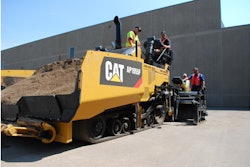Construction News Tracker is presented by Caterpillar and produced by ForConstructionPros.com.
Imagine unveiling a new national apprenticeship program and specifically excluding the construction industry from it. That’s what the U.S. Department of Labor has done, and AGC is whopping mad over the decision. CEO Stephen Sandherr, noting that construction has faced a hard time filling jobs with qualified candidates, finds it deeply troubling that the Trump Administration opted to not include construction in its new apprenticeship proposal. On top of that, the Labor Department is failing to provide any rationale on why the industry has been excluded from the effort. It’s a troubling set of events.
A so-called minibus bill has passed the House of Representatives and been sent to the Senate for approval to fund the nation’s transportation programs in 2020. Also known as the THUD Bill, it would provide $137 billion for infrastructure, modernize public housing and deliver broadband to rural communities. The bill that passed the House June 25th allocates $86.6 billion to the Federal DOT - $167 million more than the enacted 2019 level - and $1 billion to the DOT infrastructure grants program.
Construction spending fell 0.8% in May, according to the Commerce Department, for the first drop in six months. The seasonally adjusted annual rate is $1.29 trillion. Residential spending was off 0.6% despite 1.9% growth in multifamily homes while nonresidential spending fell 0.9% as commercial construction continued its decline another 3.3% in May. A 3.2% drop in the vast highway and street sector dragged construction spending down 9/10ths of a percent, the first decline in five months.
The latest jobs report is a solid gain, beating out economists’ predictions. The nation gained 224,000 jobs in June, eclipsing the economists’ prediction of 170,000. The unemployment rate is at 3.7%. The rebound came after a dismal May report, easing fears that an economic expansion could be running out of steam. Employers have now added jobs for 105 consecutive months.
Construction Adds 21,000 Jobs in June
Transportation for America claims in a new study the nation would need $231.4 billion per year over the next six years to maintain and repair its roadways. In its latest study the group says 37 states have worsening road conditions while 20% of our roads nationwide are in poor condition.
IHS Markit reports that construction cost increases slowed in June, pegging its index at 55.7, a stark drop from its previous high of 63.8 in May. The materials, equipment and subcontractor labor markers that make up the index showed declines, which means that overall price increases were less last month. Survey respondents to IHS indicated that prices for nine of 12 components were lower than in May - notably for fabricated steel, carbon steel pipe and copper based wire and cable.
There’s a drop in U.S. home builder confidence in June, according to the U.S. Commerce Department brought on by concerns over higher construction costs and trade issues from May. Total housing starts in May dropped 9/10ths of percent, more than doubling the slide by economists forecasts. A hike in multifamily housing was not enough to offset a 6.4% drop in single family starts. The federal report indicates residential building continues to be fairly solid despite the fact total housing starts this year are 5.3% below that of 2018 in the same month.
Nineteen states have voted to raise vehicle fees or taxes since the first of the year generating $1.8 billion in new revenue for roads and bridges. Among them are Kansas with an annual fee for all electric vehicles; West Virginia made a $54 million appropriation from a budget surplus; while four states enacted statewide gas tax increases; and Virginia approved a regional fuel and diesel tax hike along Interstate 81 to upgrade that highway. In all 46 states adopted 300 bills to improve their infrastructure.
Recall the bridge collapse March 15, 2018, near Florida International University in Miami that claimed the lives of six people? OSHA, the federal safety agency, places blame for the structural failure on the contractor, Figg Bridge Engineers and Munilla Construction Management. OSHA’s new report claims the company’s engineer of record failed to recognize the danger of collapse hours before it occurred, should have been shored up at appropriate locations, and traffic should never have been allowed to pass beneath the structure. OSHA also says deep structural cracking jeopardized the walking bridge integrity, and the fact the post tensioning bars were being re-tensioned over live traffic never should have happened.
In closing, never does a man stand so tall when he foregoes revenge and dares to forgive an injury.
This is Construction News Tracker looking over the industry that makes the world a better place, presented by Caterpillar and produced by ForConstructionPros.com.
Follow us on social media at Twitter using #constructionnews, YouTube and Facebook as the streaming Web never ends.
View previous Construction News Tracker videos on ForConstructionPros.com.



















